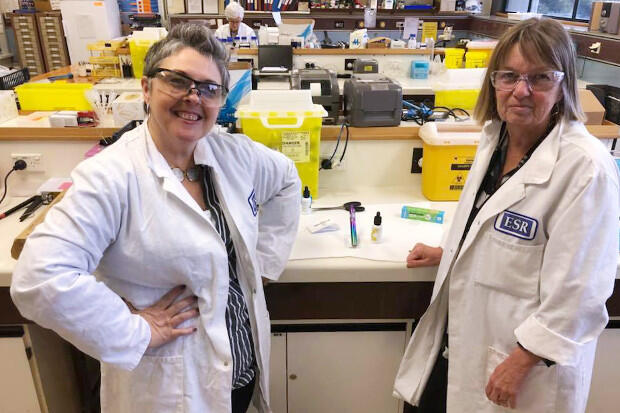
July 25, 2018
New Zealand officials tap VCU professor’s expertise to learn about potential vaping hazards
Share this story
A Virginia Commonwealth University professor who studies illicit drug use and e-cigarettes traveled throughout New Zealand this summer as part of a fellowship to inform law enforcement and health officials about how e-cigs work and potential misuse of the devices.
Michelle Peace, Ph.D., an associate professor and a forensic toxicologist in the Department of Forensic Science in the College of Humanities and Sciences, visited New Zealand as this year’s International Vision Fellow of the Institute of Environmental Science and Research. She has received funding the past four years from the National Institute of Justice to evaluate e-cigarettes’ potential for abuse and the subsequent impact on the criminal justice system.
As part of the fellowship, which each year brings an international scholar to New Zealand to provide expertise on emerging scientific topics, Peace delivered a number of talks about her research on the rise of e-cigarettes in the United States and their evolution as drug paraphernalia. She spoke to officials with New Zealand’s Ministry of Health; police units focused on organized crime, drugs and intelligence; coroners; crime labs; poison control offices; and university researchers.
“They have a motto of ‘Prevention First,’” Peace said. “‘How do we get ahead of this?’ ‘What's happening in the United States?’ Because they tend to see things flow culturally from the United States two to three years after something’s rise in the U.S. They figured if the United States is dealing with electronic cigarettes now, then we need to get educated about this.”
They’re trying to get their arms around tobacco products to promote a healthier citizenry. They have a goal of being tobacco-free by 2025.
E-cigarettes essentially were banned in New Zealand until this summer when the Ministry of Health opted not to appeal a court ruling that found most tobacco products could be legally sold under the country’s Smoke-free Environments Act.
“They’re trying to get their arms around tobacco products to promote a healthier citizenry,” Peace said. “They have a goal of being tobacco-free by 2025.”
To reduce smoking, the country has raised taxes dramatically on cigarettes, Peace said. And some are considering e-cigarettes as another potential tool for helping people ease out of their tobacco addiction.
“I agree that e-cigarettes can be a great tool for smoking cessation, no doubt about it,” Peace said. “But from my perspective — and I'm a forensic toxicologist, so I'm risk averse — I’m concerned that when we say these are healthier options, the public mistakenly thinks that e-cigarettes are healthy options.”
Peace would like to see a lot more transparency when it comes to e-cigarettes.
“I get it, these are tools. I get it, people love their vices,” she said. “But can we at least have some education so that people can make educated decisions about what they are choosing to put in their bodies? Because right now, when it comes to e-cigarettes, we really don't know the long-term impact of vaping, or the data is conflicting data at best.”
Robyn Somerville, Ph.D., a senior forensic scientist in the Institute of Environmental Science and Research, applied to bring Peace to New Zealand as this year’s International Vision fellow, having become aware of her research into the use of e-cigarettes as a device to deliver controlled substances.
“Illicit drug users in New Zealand have been known to ‘look outside the square’ when it comes to finding ways to synthesize and use illicit substances and ESR had started to see some of these illicit e-liquids being imported into our country,” Somerville said. “Dr. Peace’s team at VCU had a wide range of experience in this field and it was an opportunity for ESR and our clients to learn more about vaping, analysis of the e-liquids and the potential for abuse, at a time of increasing social acceptance of the use of e-cigarettes.”

Peace’s visit encouraged New Zealand authorities to think about both the law enforcement and public health implications of e-cigarettes.
“The talks delivered on vaping have significantly raised awareness of the use of these devices to deliver illicit substances and the need to think of them from this perspective, especially when found associated with crime scenes,” Somerville said. “From a medicinal perspective, the variation of actual nicotine levels in the e-liquids was of interest to our health clients.”
In her talks, Peace also warned of a potential problem because many e-liquids used in e-cigarettes contain ethanol. If people are inhaling ethanol when they vape, she said, there could be major implications around the world.
“We did a survey of e-liquids and demonstrated that 53 of 56 e-liquids had ethanol in them, and some with significant levels above 10 percent,” she said. “There is some evidence in the literature that vaping ethanol will lead to ethanol metabolites in urine. So from a criminal justice perspective, how is vaping going to impact a roadside breath test? How's that going to impact kids under the age of 21 who are vaping and test positive for ethanol? How's that going to impact somebody on probation or somebody on parole who is supposed to be abstaining from alcohol but when they vape, they're suddenly testing positive for ethanol?”
Peace, who is president of the Society of Forensic Toxicologists Inc. and who served on a national task force focused on forensic toxicology and the opioid crisis, also spoke in New Zealand about opioid addiction and overdoses in the United States.
“Again, based on this whole [idea] of whatever's happening in the United States usually hits New Zealand two to three years later, they wanted to know the nature of the opioid epidemic in the states,” Peace said.
In addition to giving talks to law enforcement and health officials, Peace was interviewed on a national TV show called “The Project,” on which she discussed the dangers of vaping.
“Dr. Peace’s willingness to share her expertise and knowledge in these areas was greatly appreciated,” Somerville said.
Subscribe to VCU News
Subscribe to VCU News at newsletter.vcu.edu and receive a selection of stories, videos, photos, news clips and event listings in your inbox.










